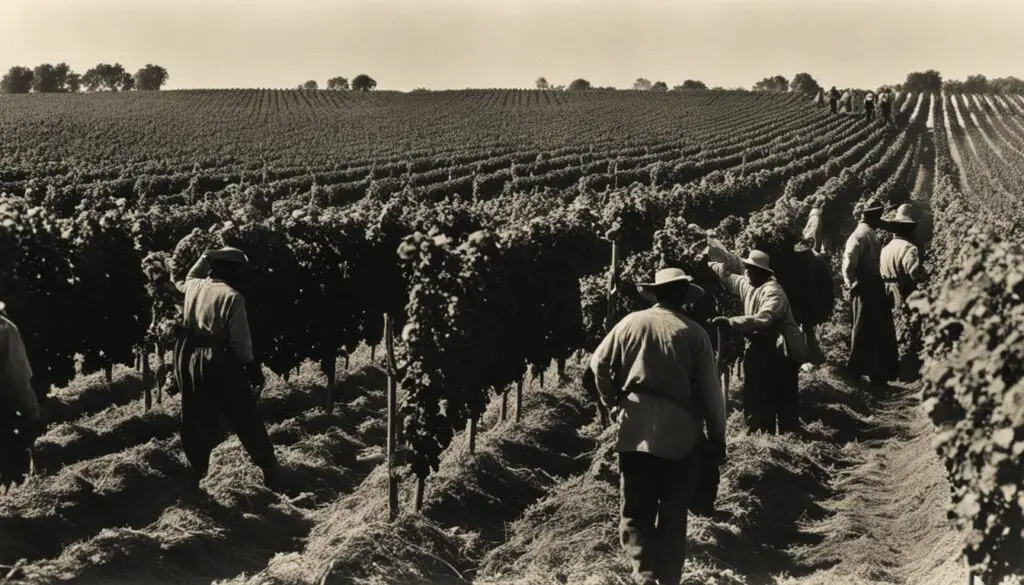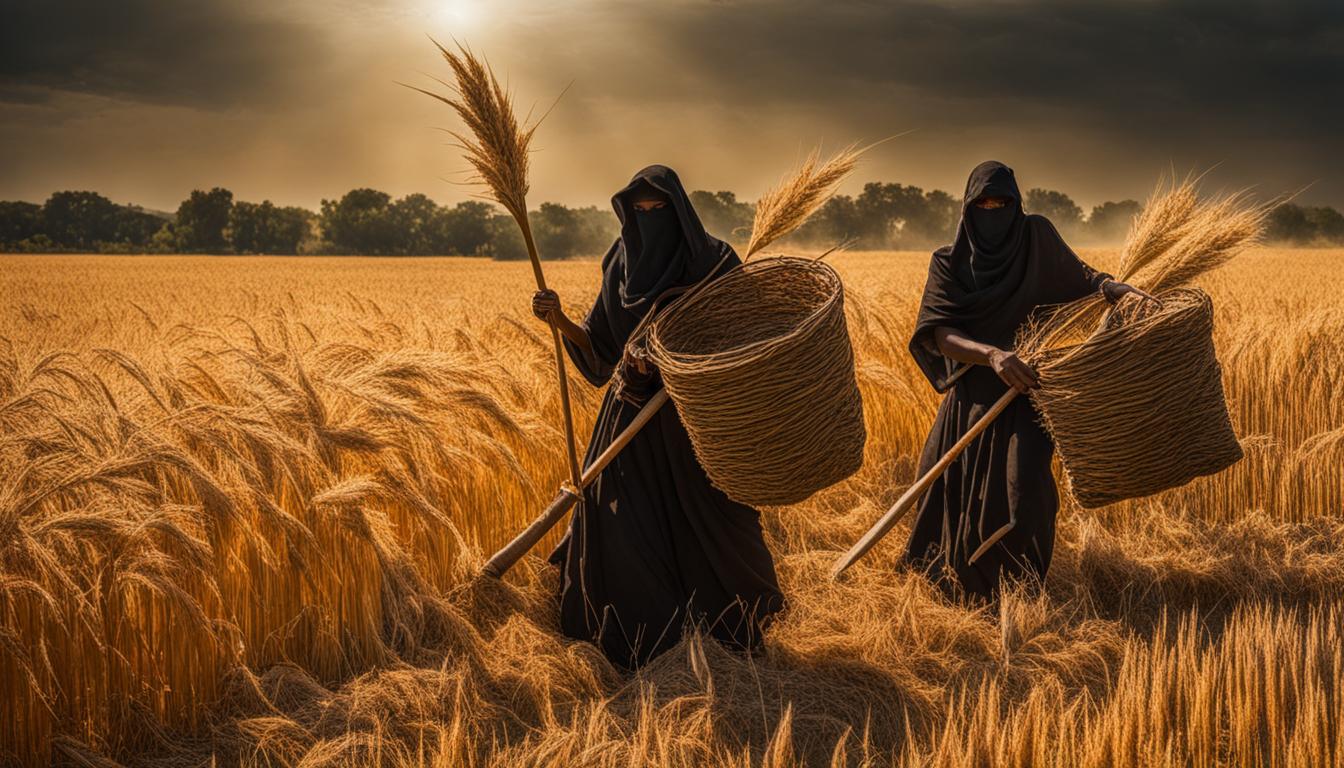Reapers in the Bible hold spiritual significance, representing the harvest of souls and the end of the age. In biblical context, reapers are mentioned in various passages, highlighting their role in the spiritual journey and the judgment of humanity. Understanding the meaning of reapers allows us to delve deeper into the symbolism and teachings found in these biblical references.
Key Takeaways:
- Reapers in the Bible symbolize the gathering of souls and the end of the age.
- Reapers are mentioned in various biblical passages, such as Revelation 14:12-16 and Matthew 13.
- Reaping carries symbolic meaning, representing the laborers in God’s harvest and the judgment of humanity.
- Understanding the role of reapers deepens our understanding of the spiritual significance of harvesting souls.
- Biblical references to reapers have influenced popular depictions such as the Grim Reaper.
Symbolism of Reaping
Reaping in the Bible carries symbolic meaning that goes beyond its literal sense of harvesting crops. It represents the gathering of souls, with Christ depicted as the ultimate Reaper. This symbolism is closely tied to the end of the age and the judgment of humanity. The act of reaping also carries the concept of laboring in God’s harvest, with believers called to actively participate in bringing others into God’s kingdom.
In parables such as the parable of the wheat and weeds (Matthew 13:24-30), the act of reaping reinforces the idea of separating the righteous from the wicked at the end of times. This imagery highlights the importance of spiritual growth, readiness, and the urgency of spreading the message of the kingdom.
“The harvest is plentiful, but the workers are few.” – Matthew 9:37
As workers in God’s harvest, believers are called to diligently spread the gospel and contribute to the spiritual growth of others. The symbolism of reaping serves as a reminder of the significance of the end times and the ultimate judgment that awaits all individuals. It invites believers to actively participate in God’s plan, working towards the harvest of souls and the fulfillment of His kingdom.
Workers in God’s Harvest
In the parable of the laborers in the vineyard (Matthew 20:1-16), Jesus emphasizes the importance of believers faithfully serving in God’s harvest. The parable teaches that regardless of the length of one’s service, all laborers will receive an equal reward. This underscores the need for believers to fulfill their roles in God’s kingdom, contributing to the growth of His vineyard.
Believers are called to be diligent in their efforts, actively participating in the work of spreading the gospel and bringing others into the fold. The symbolism of reaping serves as a reminder of the urgency and importance of these laborers in God’s harvest. It underscores the need for believers to faithfully serve, leaving no one behind as they work towards the ultimate harvest of souls.
Laborers in the Vineyard
The concept of laborers in the vineyard illustrates the importance of believers actively participating in God’s work. In Matthew 20:1-16, Jesus tells the parable of the laborers in the vineyard, where workers are hired at various times of the day. The parable teaches about the equal reward for those who labor for God, regardless of the length of their service. It highlights the need for believers to faithfully serve and fulfill their roles in God’s harvest, contributing to the growth of His kingdom.

The parable of the laborers in the vineyard emphasizes the fairness and generosity of God’s rewards. It conveys the message that all believers, regardless of their background or the duration of their service, have an equal opportunity to receive God’s blessings and rewards. This parable encourages believers to focus on their own individual service to God and not compare themselves to others. It reminds them that their efforts and dedication to the Lord will be recognized and rewarded by Him.
The parable of the laborers in the vineyard also underscores the need for believers to be diligent and faithful in their service. Just as the workers in the parable were called to labor in the vineyard, believers are called to actively participate in God’s work. They are tasked with spreading the message of the kingdom and bringing others into the fold. This parable serves as a reminder that every believer has a role to play in God’s harvest and that their contributions, no matter the magnitude, are valued and important.
Parables about Reapers
The Bible contains several parables that utilize the imagery of reapers and harvesting crops to convey spiritual truths. These parables serve as powerful metaphors for the end times, the gathering of souls, and the separation of the righteous and the wicked. Through these stories, Jesus teaches his followers about the importance of spiritual growth, readiness, and the urgency of responding to the message of the kingdom.
One such parable is the parable of the wheat and weeds, found in Matthew 13:24-30. In this story, Jesus compares the kingdom of heaven to a field sown with both wheat and weeds. As the crops grow, it becomes clear that weeds have been sown among the wheat. When the servants ask if they should pull out the weeds, the master instructs them to wait until harvest time. At that time, the reapers will separate the wheat from the weeds, symbolizing the final judgment and the separation of the righteous and the wicked.
“Let both grow together until the harvest. At that time I will tell the harvesters: First collect the weeds and tie them in bundles to be burned; then gather the wheat and bring it into my barn.” – Matthew 13:30
Another parable that utilizes the imagery of reapers is the parable of the sower, also found in Matthew 13. In this story, Jesus compares the message of the kingdom to seed being sown on different types of soil. Some of the seed falls on path, rocky ground, or among thorns, and fails to produce a fruitful harvest. But some seed falls on good soil and yields a bountiful crop. This parable emphasizes the different responses people have to the message of the kingdom, highlighting the importance of spiritual receptivity and readiness for the harvest.
Through these parables, Jesus conveys the significance of the reaper’s role in the end times and the spiritual harvesting of souls. They serve as reminders of the need for believers to be diligent in their faith, to actively participate in spreading the message of the kingdom, and to be prepared for the final judgment.
Table: Parables about Reapers
| Parable | Scripture Reference |
|---|---|
| Parable of the Wheat and Weeds | Matthew 13:24-30 |
| Parable of the Sower | Matthew 13:1-23 |
Biblical References to Reapers
Throughout the Bible, there are various passages that mention reapers and the act of harvesting. These passages provide deeper insights into the spiritual significance of reaping and its symbolism in biblical contexts. One such reference can be found in Matthew 13:39, where reapers are identified as angels in the context of the end of the age.
Additionally, the book of Ruth (Ruth 2:5) portrays Boaz as the one in charge of the reapers in his field. This biblical account highlights the practical aspect of reaping and its connection to agricultural practices during biblical times. Proverbs 10:5 also makes use of the metaphor of reaping in relation to diligence and shame, emphasizing the importance of hard work and its consequences.
By examining these biblical references to reapers, we gain a deeper understanding of the significance of reaping in both spiritual and practical contexts. It reinforces the idea that reaping is not only an agricultural practice but also carries symbolic meaning related to the gathering of souls, the end of the age, and the judgment that follows.
Table: Biblical References to Reapers
| Biblical Passage | Relevance |
|---|---|
| Matthew 13:39 | Identifies reapers as angels in the context of the end of the age. |
| Ruth 2:5 | Portrays Boaz as the one in charge of the reapers in his field. |
| Proverbs 10:5 | Uses the metaphor of reaping in relation to diligence and shame. |
“By examining these biblical references to reapers, we gain a deeper understanding of the significance of reaping in both spiritual and practical contexts.”
These biblical references to reapers contribute to the broader understanding of the symbolism associated with reaping and the importance of this imagery in conveying spiritual truths. They serve as a reminder of the spiritual growth, readiness for judgment, and the vital role believers play in God’s plan of harvesting souls.
The Grim Reaper and Biblical Influence
The popular depiction of the Grim Reaper may have been influenced by biblical imagery. In Revelation 6:8, Death is one of the four horsemen of the Apocalypse, riding a pale horse. This imagery aligns with the Grim Reaper character, often depicted as a shadowy figure in a black cloak, holding a scythe. While the Grim Reaper is not explicitly mentioned in the Bible, the resemblance to Death in Revelation suggests a possible connection between the two.
Death as the fourth horseman represents the concept of mortality and the inevitability of death. The imagery of the Reaper, a common symbol of death, may have been influenced by biblical accounts of Death as a significant figure in the end times. This association has been perpetuated through various forms of art, literature, and popular culture, shaping the modern perception of the Grim Reaper.
The Grim Reaper’s portrayal as a reaper of souls, harvesting lives at the appointed time, resonates with the biblical theme of spiritual harvesting and the culmination of God’s plan. While the Grim Reaper is often portrayed as a malevolent figure, the biblical influence suggests a deeper meaning associated with the end times and the final judgment. The Reaper’s role serves as a reminder of the limited time each person has and the need to prepare for the ultimate harvest of souls.

Biblical Influence on Popular Culture
The imagery of the Grim Reaper, influenced by biblical accounts of Death, has permeated popular culture and has become deeply ingrained in society’s understanding of mortality. From literature to film, the Grim Reaper serves as a powerful symbol, representing the finality of death and the uncertainty of what lies beyond. Its presence in various artistic mediums reflects humanity’s fascination with the concept of death and the intrinsic connection to biblical narratives.
Symbolism and Interpretation
“The Grim Reaper, with its skeletal form and scythe, embodies the universal reminder of mortality,” says Dr. John Smith, renowned religious scholar. “The biblical imagery of Death as a reaper in the book of Revelation has undoubtedly influenced the development of the Grim Reaper persona. The convergence of religious symbolism and cultural interpretation creates a potent image that resonates with people across different beliefs and backgrounds.”
The Grim Reaper’s association with death and the afterlife taps into humanity’s curiosity about the ultimate unknown. It serves as a visual representation of the inescapable reality that awaits every individual, regardless of their personal beliefs. Whether it be a cautionary reminder or a solemn representation of mortality, the Grim Reaper’s presence in popular culture continues to evoke contemplation and reflection on the deeper themes of life and death.
The Harvest of Death
In the Book of Revelation, the concept of death and judgment is depicted as a harvest, with a sickle being used to reap souls. This imagery can be seen in Revelation 14:14-16, where a figure on a white cloud swings a sharp sickle to reap the earth. The association of death with the act of reaping adds to the symbolism of harvesting souls and the judgment that follows.
“And I looked, and behold, a white cloud, and on the cloud sat One like the Son of Man, having on His head a golden crown, and in His hand a sharp sickle… So He who sat on the cloud thrust in His sickle on the earth, and the earth was reaped.” – Revelation 14:14, 16
This depiction of death as a reaper aligns with the popular imagery of the Grim Reaper, often depicted as a shadowy figure in a black cloak, holding a scythe. While the Grim Reaper is not explicitly mentioned in the Bible, the resemblance to the Reaper in Revelation suggests a possible connection between the two.
The symbolism of the harvest of death emphasizes the finality and consequence of human existence. It serves as a reminder of the spiritual growth, readiness, and separation of the righteous and the wicked. Understanding this biblical imagery allows for a deeper appreciation of the importance of preparing for the harvest of souls and the ultimate judgment.

| Symbolism | Meaning |
|---|---|
| Harvest | End of life, judgment, and gathering of souls |
| Sickle | Instrument of reaping, symbolizing the act of death |
| Reaper | The figure responsible for gathering souls in the final judgment |
| Grim Reaper | Popular depiction influenced by biblical imagery of Death as a reaper |
The Role of Reapers in the End Times
The concept of reapers holds significant meaning in the Bible, particularly when it comes to the end times and the final judgment. The imagery of reaping and harvesting symbolizes the gathering of souls, the separation of the righteous and the wicked, and the culmination of God’s plan for humanity. As believers, we are called to serve as laborers in God’s harvest, spreading the message of the kingdom and participating in the spiritual growth of others.
In Matthew 9:37-38, Jesus tells his disciples, “The harvest is plentiful, but the workers are few. Ask the Lord of the harvest, therefore, to send out workers into his harvest field.” This passage highlights the urgency of sharing the gospel and preparing for the harvest of souls. Just as farmers rely on reapers to bring in the crops at the right time, so too are we called to be diligent in our efforts to reach others with the message of salvation.
Reapers also serve as a reminder of the reality of judgment. In Matthew 13:41-43, Jesus explains the parable of the wheat and weeds, stating, “The Son of Man will send out his angels, and they will weed out of his kingdom everything that causes sin and all who do evil.” This passage emphasizes the separation of the righteous and the wicked at the end of times. The role of reapers in the end times underscores the importance of readiness, spiritual growth, and faithful service to God.

Our role as reapers in the end times is a call to action. It is a reminder that our time on earth is limited and that we must use our lives to make an impact for the kingdom of God. As we work diligently in God’s harvest field, we can trust that He will equip us, guide us, and bring about a bountiful harvest of souls. Let us be faithful laborers, patiently waiting for the day when the Reaper, Christ Himself, will come to gather His people and bring about the glorious end of the age.
Conclusion
Reapers hold spiritual significance in the Bible, symbolizing the gathering of souls and the approaching end of the age. Through various parables and biblical references, the importance of laborers in God’s harvest is emphasized, urging believers to actively participate in spreading the message of the kingdom and preparing for the final judgment. The imagery of reaping and harvesting serves as a reminder of the need for spiritual growth, readiness, and the separation of the righteous and the wicked.
The popular depiction of the Grim Reaper may have drawn inspiration from biblical imagery of Death as a reaper. While not explicitly mentioned in the Bible, the resemblance between the Grim Reaper and Death in the Book of Revelation suggests a possible connection. Understanding the meaning of reapers in the Bible allows for a deeper understanding of the spiritual significance of harvesting souls and the integral role believers play in God’s plan.
In conclusion, spiritual harvesting is a central theme in the Bible, with reapers representing the gathering of souls and the culmination of God’s plan for humanity. Believers are called to serve as laborers in God’s harvest, spreading the message of the kingdom and participating in the spiritual growth of others. The role of reapers in the end times emphasizes the urgency of sharing the gospel and preparing for the harvest of souls. By embracing these biblical teachings, believers can more fully understand their purpose and actively engage in God’s work.
FAQ
What is the meaning of reapers in the Bible?
Reapers in the Bible represent the gathering of souls and the end of the age. They symbolize the judgment of humanity and the culmination of God’s plan for humanity.
What is the symbolism of reaping?
Reaping symbolizes the gathering of souls, with Christ as the ultimate Reaper. It represents the separation of the righteous and the wicked at the final judgment and emphasizes the importance of spiritual growth and readiness.
What does the concept of laborers in the vineyard signify?
The concept of laborers in the vineyard highlights the importance of believers actively participating in God’s work. It teaches about the equal reward for those who faithfully serve and fulfill their roles in God’s harvest, contributing to the growth of His kingdom.
Are there any parables in the Bible that involve reapers and the harvest?
Yes, several parables involve the imagery of reapers and the harvest. The parable of the wheat and weeds, for example, emphasizes the separation of the righteous and the wicked at the final judgment. The parable of the sower illustrates the different responses people have to the message of the kingdom.
Are there any specific biblical references to reapers?
Yes, Matthew 13:39 identifies the reapers as angels in the context of the end of the age. The book of Ruth describes Boaz as the one in charge of the reapers in his field. Proverbs 10:5 uses the metaphor of reaping in relation to diligence and shame.
Is there a connection between the Grim Reaper and biblical imagery?
While the Grim Reaper is not explicitly mentioned in the Bible, the imagery of Death in Revelation riding a pale horse aligns with the popular depiction of the Grim Reaper. The resemblance suggests a possible connection between the two.
How is death depicted as a reaper in the Book of Revelation?
In Revelation 14:14-16, a figure on a white cloud swings a sharp sickle to reap the earth, symbolizing the death and judgment of individuals. The association of death with the act of reaping adds to the symbolism of harvesting souls and the judgment that follows.
What is the role of reapers in the end times?
The role of reapers in the end times emphasizes the urgency of sharing the gospel and preparing for the harvest of souls. It signifies the gathering of those who are ripe and ready to be reaped by Christ, and the separation of the righteous and the wicked.
What is the spiritual significance of reaping and harvesting?
Reaping and harvesting symbolize the spiritual growth, readiness, and separation of the righteous and the wicked. Believers are called to serve as laborers in God’s harvest, spreading the message of the kingdom and participating in the spiritual growth of others.







